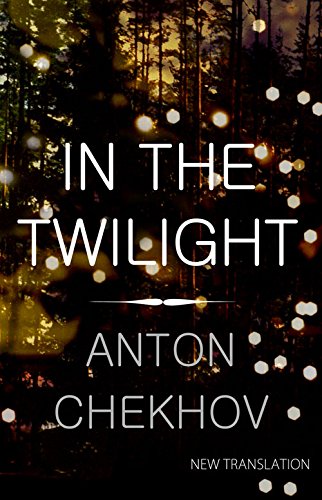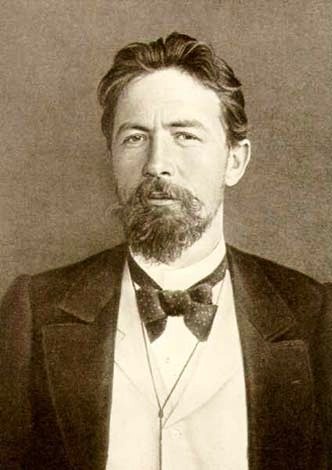
photo © artnabart, 2013
by Peter Jordan
In a letter to his older brother Alexander, dated 10 May 1886, Anton Chekhov set out his six principles of writing: ‘truthful descriptions of persons and objects; total objectivity; extreme brevity; compassion; no political-social-economic effusions; audacity and originality: eschew cliché.’ These six rules could very well define Modernism, yet Chekhov isn’t classed as a Modernist and his best work was written a full thirty years before the avant-garde writers of the early 20th century – James Joyce, Ezra Pound, Ernest Hemingway – were credited with changing the literary landscape.
I recently took a class on Chekhov’s short fiction facilitated by a young Muscovite who was subsidising her PhD by teaching Russian literature. When we had all taken a seat she held aloft a printed handout of Chekhov’s ‘The Lady with a Dog’ and declared, “This is the greatest short story ever written!” She went on to say that Chekhov had taught us all how to write. I don’t doubt her on either count. Although Chekhov is probably best known for his plays – only Shakespeare’s work is performed more often – it is his short stories that have had the greatest influence on modern writing. From his early comedic sketches to his later more mature short stories, no writer gets closer to articulating the human condition. It took me a long time to understand what he was doing, I still don’t fully understand, I simply know that when reading his work I feel some emotional shift.
Chekhov was born in Taganrog, a port in southern Russia, on January 17th 1860, the third child of six children. His father was an autocratic tyrant – the young Chekhov was forced to sing in the choir, which his father conducted, and work long hours in his family grocery business. His mother was a storyteller who kept her children entertained with her creative talents. Chekhov said he got his powers from his father and his soul from his mother. When the grocery business failed the family fled to Moscow, while Chekhov remained to complete his studies. Although only a youth, he worked at whatever he could – catching goldfinches and selling them, writing for the local papers – and sending whatever money he could to Moscow. Three years later, at the age of nineteen, he joined his family where he chose to study medicine at the university in Moscow, later describing medicine as his lawful wife, literature his mistress.
 While a student, he wrote farcical stories aimed at paid publication in the humourist magazines – his brother Alexander was already earning a small income this way. Chekhov wrote to make money, as he was now the unofficial head of the family – his father was no longer able to support the family financially, and his two older brothers were unable to step up to the plate.
While a student, he wrote farcical stories aimed at paid publication in the humourist magazines – his brother Alexander was already earning a small income this way. Chekhov wrote to make money, as he was now the unofficial head of the family – his father was no longer able to support the family financially, and his two older brothers were unable to step up to the plate.
In 1884, he qualified as a physician, which he considered his principal profession, though he made little money from it. That same year Chekhov found himself coughing blood – he had developed tuberculosis, and he knew fully what that meant. Yet, despite declining health, he was prodigious, writing long hours, studying, socialising. Eventually his writing came to the notice of Dmitry Grigorovich, a distinguished writer, who suggested in a letter, received in March 1886, that Chekhov give more consideration to his craft: ‘You must have respect for a talent which is so rarely granted. Stop doing hack work.’ Chekhov replied immediately by letter saying this advice had struck him ‘like a bolt of lighting’ – that he had been writing with no regard for himself or the reader. He began to take his writing more seriously. Two years later, at the age of twenty-eight, he was awarded The Pushkin Prize for his collection of stories In The Twilight.
In 1892, with the money earned from his writing, he moved to a small estate south of Moscow. The house was effectively a General Practice, with rich and poor alike queued outside his door. It left him little time to write but gave him much material for his later work. Despite his illness, and the long hours, he still wrote: improving, editing, reworking.
His short story ‘The Lady with a Dog’, published in 1899, is regarded as a masterpiece. Like all great Chekhov stories it is charged with emotion. It tells the story of a young married woman, Anna, who travels to Yalta and is skillfully seduced by an older man, a serial womaniser named Gurov who has been ‘schooled by bitter experience’. After they consummate their affair, Gurov responds to Anna’s sudden onset of guilt, not by assuaging her fears with mawkish dialogue, but by cutting himself a slice of watermelon and eating it in silence. If Chekov had come out and told us how Gurov felt it would have lost its emotional impact, it would have smacked of sentimentality. Instead, he asks the reader to supplant their own emotion into the silent void left by Gurov. The reader becomes emotionally involved in the story because they are forced to fill the silence.
As the story progresses Gurov slowly changes – when Anna returns to Moscow he can’t stop thinking about her.
One evening, coming out of the doctors’ club with an official with whom he had been playing cards, he could not resist saying, “If only you knew what a fascinating woman I made the acquaintance of in Yalta!”
The official got into his sledge and was driving away, but turned suddenly and shouted, “Dmitri Dmitritch!”
“What?”
“You were right this evening: the sturgeon was a bit too strong!”
These words, so ordinary, for some reason moved Gurov to indignation, and struck him as degrading and unclean. What savage manners, what people! What senseless nights, what uninteresting, uneventful days! The rage for card-playing, the gluttony, the drunkenness, the continual talk always about the same thing. Useless pursuits and conversations always about the same things absorb the better part of one’s time, the better part of one’s strength, and in the end there is left a life grovelling and curtailed, worthless and trivial, and there is no escaping or getting away from it – just as though one were in a madhouse or a prison.
In that same letter to his older brother Alexander, Chekhov went on to say: ‘Avoid describing the emotional states of your protagonist, one should try to make these apparent from their actions.’ This is ‘show, don’t tell’ – the very thing we first learn as apprentice writers. In the quoted passage above Chekhov shows his genius by appearing to bend his own rules: he does describe  the emotional state of his protagonist, in a stream of conscious tirade, but he does this to show Gurov’s confusion. The reader then unconsciously interprets his pain, experiencing the true emotion: Gurov does not yet know he is in love, but the reader does. Only as the story closes does Gurov finally realise he has fallen in love. However, while he and Anna talk of finding some way of creating a future together, the story ends without resolution.
the emotional state of his protagonist, in a stream of conscious tirade, but he does this to show Gurov’s confusion. The reader then unconsciously interprets his pain, experiencing the true emotion: Gurov does not yet know he is in love, but the reader does. Only as the story closes does Gurov finally realise he has fallen in love. However, while he and Anna talk of finding some way of creating a future together, the story ends without resolution.
This was not the literary norm at the end of the 19th Century – readers expected action, plot twists, high drama and finally resolution as the very essence of a short story. Chekhov changed all of that. He wrote about life as it is: the story arises from the characters and their actions rather than having the characters react to a story imposed upon them.
‘The Lady with a Dog’ was written in Yalta where Chekhov relocated to take advantage of the warmer climate owing to his advancing tuberculosis. Within five years of the story’s publication the illness had killed him. Chekhov influenced generations of great writers, from Hemingway and Katherine Mansfield to Raymond Carver. His literary techniques were employed and explored by the Modernists and there isn’t a good contemporary short story writer who hasn’t been influenced by his work. Carver summed it up best in his Art of Fiction interview for The Paris Review:
I suppose he’s the writer whose work I most admire. But who doesn’t like Chekhov? […] Reading what Chekhov had to say […] made me see things differently than I had ever before.
I believe what truly sets Chekhov apart is his peculiar ability to have me interpret the emotional wellbeing of his characters by unconsciously supplanting my own emotional experience into the void, given the information that precedes it. And it is in the filling of this emotional void that has me experience the emotion as if it were my own. His short stories have me sitting staring into nothingness after the final line, the book still held in my hand. Great writing is unshakable and there is something about the best of Chekhov’s work, something that remains long after the initial reading. I believe he trusts his reader and, although written over a century ago, his work is timeless.
~
 Peter Jordan is a short story writer. His work has been shortlisted for various competitions and published in various anthologies. His short stories are available for download @etherbooks.com. He lives in Belfast, where he is taking a PhD in Creative Writing. You will find him on twitter @PM_Jordan.
Peter Jordan is a short story writer. His work has been shortlisted for various competitions and published in various anthologies. His short stories are available for download @etherbooks.com. He lives in Belfast, where he is taking a PhD in Creative Writing. You will find him on twitter @PM_Jordan.

